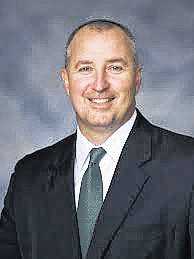PICKENS COUNTY — Dr. Danny Merck, Superintendent of the School District of Pickens County, will be one of 23 South Carolina education stakeholders who will visit Finland’s public schools, announced SDPC officials this week.
The visit is to gain insight into critical challenges in public education in South Carolina, they said.
Merck is one of two superintendents in a group which includes educators, policymakers, community and business leaders, journalists and funders.
Statistics show Finland’s public education system consistently performs at the top of international rankings, with the great majority of students going on either to academic or vocational post-secondary education. The field study will be led by Public Education Partners, Furman University’s education department and the Riley Institute at Furman.
“I have studied Finland’s success extensively as we are constantly looking for the best ways to improve learning,” Merck said. “To see their schools and speak to their education leaders in person is an invaluable opportunity.”
“As we face South Carolina’s education challenges, such as our teacher shortage, we must learn from others who have worked to address similar challenges,” said Ansel Sanders, president and CEO of Public Education Partners. “Though Finland is different from South Carolina in that it is a relatively homogeneous country with little poverty, the Finnish approach to education, as well as how the Finns developed this system, offers some useful examples that are applicable in and transferable to South Carolina,” he said.
Michael Svec, professor of education at Furman, said Finland’s approach to teacher education is relevant in South Carolina, where public schools face a growing teacher shortage. He said all teachers in elementary and secondary schools in Finland are required to have a master’s degree, which helps drive higher levels of trust and respect for teachers.
“Furman has offered a five-year program for teachers in training since 2000, an approach that significantly reduces the rate at which teachers leave the profession in their first five years in the classroom,” Svec said.
Svec said that Finnish teachers and schools have a lot of autonomy and the national curriculum guidelines allow room for creativity. Every child has access to early childhood education and children start first grade at age seven. There are far fewer standardized tests, and those that are administered are not tied to accountability.
Schools also have shorter school days and 90 minutes of recess each day.
“All of these practices could, to some degree, help inform what we do in South Carolina,” Svec said.
“The sharing of information will not be one-sided,” said Don Gordon, executive director of the Riley Institute at Furman. “South Carolina’s growing success in community schools that support rural communities will be of interest to Finnish educators. They’ll also be interested in our growing network of project-based learning schools because they are transitioning to similar methods of teaching.”
The field study will take place over seven days in Helsinki and Oulu in October.
Participants will observe in primary and secondary schools, including special education settings and inclusive preparatory education intended to support Finland’s growing number of immigrants and foreign language speakers.
Additionally, they will meet with policymakers, university faculty responsible for teacher preparation, school leaders, teachers, students and family members.



